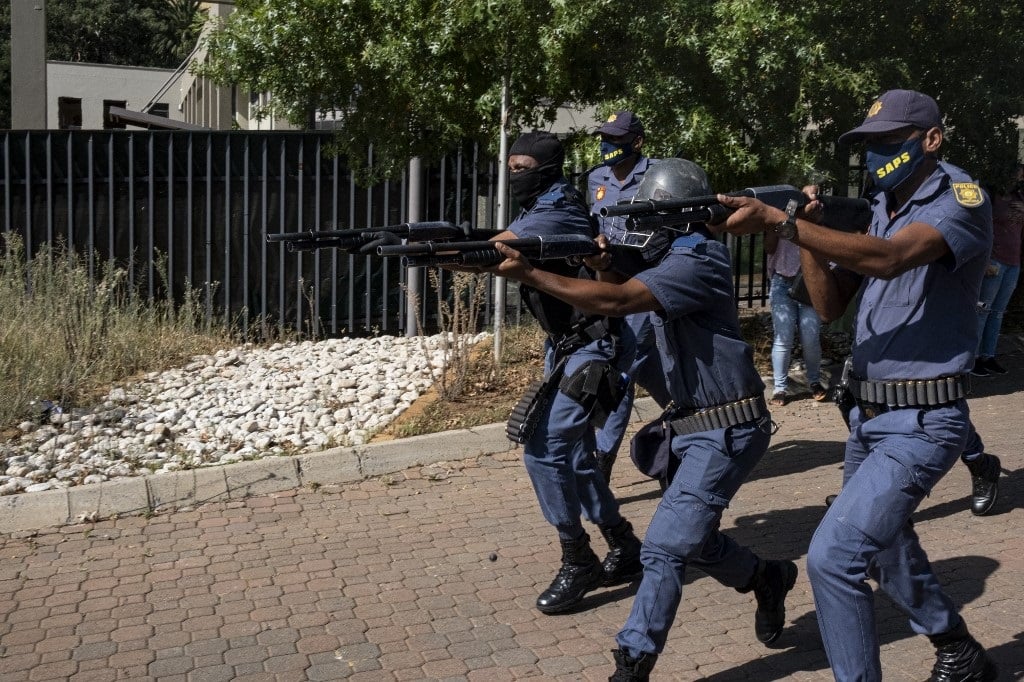
An obvious solution to police brutality is to radically professionalise the police service in a transparent manner, with regular updates on training statistics, curricula and other relevant metrics, writes Mmusi Maimane.
"Police accused of heavy-handedness after man killed in Wits student protests," read the headline following the recent killing of a citizen by a member of the South Africa Police Service (SAPS) in broad daylight earlier this month.
Mthokozisi Ntumba, not part of the student protests, was leaving a medical centre when he was shot and killed by the SAPS on an inner-city Johannesburg street.
Untimely death
On Sunday, we celebrated Human Rights Day. At this time, we should reflect on Ntumba’s tragic, untimely death which is sadly not the first of its kind. Andries Tatane, Collins Khoza, Samantha Mathane, Nathaniel Julies and many other join him on this painful and shameful tally. We must do all we can to ensure it is the last.
It is not enough that the responsible police officers are fired and/or arrested, and for politicians and government ministers to descend on the deceased’s family home in a race to the bottom of the political point scoring game.
This time, we must refocus our attention away from the firing of the trigger and towards the complex and toxic ecosystem that results in such tragedy. After we mourn, we must tackle this issue head on in a comprehensive manner. Where does it begin, the question begs? The United Kingdom offers an instructive insight.
Earlier this week, the UK’s House of Commons held a heated debate over the Police, Crime, Sentencing and Courts Bill (The "Policing Bill") introduced by the Conservative-led government’s Home Secretary, Priti Patel. The envisaged law is controversial as it hands greater power to the police to control, manage and shutting down protests – including peaceful protests - in what many analysts describe as a giant step towards curtailing of basic social and political freedoms.
Now the UK is by no means a military state – far from it in fact. However, lawmakers are raising legitimate red flags as to what such a law would communicate to both police officers and citizens alike. It would shift the needle of power further away from the public and closer to the authorities and the police.
We have seen the story on our own continent many times. Liberators turned dictators using brute force and violence to suppress and repress the public. What follows? Crackdown against political dissent, curtailing of basic rights such as freedom of association and expression, and disproportionate force used by empowered members of the police and at times the army.
Leadership attitude and police force aptitude
Since 2018, just shy of 6 000 citizens have been victims of police brutality in South Africa. To address this and to reverse the slide towards such dangerous authoritarianism is down to two interconnected variables: leadership attitude and police force aptitude.
In terms of leadership attitude, Police Minister Bheki Cele is where the buck stops. From his militaresque obsession with being referred to as "General", to encouraging excessive force and “shoot to kill” rhetoric, Cele is a significant part of our policing problem. There exists a particularly warped attitude towards violence and authority in the SAPS. This is exacerbated by the squabble for power between him and the national police commissioner, General Khehla Sitole. Such political battles undermine the credibility of our police. The fish rots from the head down and the Minister needs to shape up or shift out.
The minister’s blasé approach to implementing the Marikana report recommendations shows a lack of seriousness in addressing policing failures that cost human lives. In addition, Cele has been sitting for two years on a report mandated by Marikana Commission chair, Judge Ian Farlam, which provides strategic guidance on how to deal with challenging within the SAPS, including both transform and professionalise the police.
READ | Analysis: Lockdown policing is not lekker
This leads to the second interconnected variable: aptitude of the police force. The most appropriate measure of the ability and skill of our police force is whether it can fulfil its constitutional mandate to fight crime. The latest crime stats answer that question with a resounding "no" as crime is up on almost every indicator with no signs of bucking the trend.
Our police service is drastically underequipped both in skill and in resource. An array of various statistics in the public domain illustrates this point. A 2017 report showed that at the time, no less than 3 500 policemen and women were uncertified to carry firearms, and 11 000 without competency certificates. Between 2013 and 2018, 658 police dockets went missing under SAPS watch. As of 2019, 4 000 officers with criminal convictions. And the trend unfolds.
Professionalise the police service
The obvious solution is to radically professionalise the police service in a transparent manner, with regular updates on training statistics, curricula and other relevant metrics. This will in turn improve public order policing and crowd control tactics, ensuring we have a professionalised police service instead of a militarised one. Police services ought to be decentralized and localized in order for better coordination and partnership with community stakeholders.
As we head towards the Local Government Elections at the end of the year, service delivery protests will only increase in volume and frequency. The clarion call to government is to not waste another moment in transforming the police service from top to tail. We cannot afford to lose any more innocent lives at the hands of the police.
- Mmusi Maimane is the Chief Activist of the One South Africa Movement
